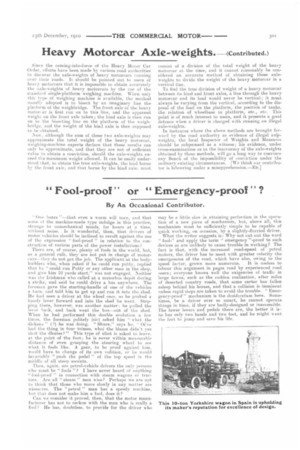" Fool-proof " or " Emergency-proof " ?
Page 7

If you've noticed an error in this article please click here to report it so we can fix it.
By An Occasional Contributor.
One hears "—that even a worm will turn, and that -some if the machine-made type indulge in this practice, .strange to unmechanical minds, for hours at a time, without noise. Is it wonderful, then, that drivers of motor vehicles should be inclined to revolt against the use of the expression " fool-proof " in relation to the construction of various parts of the power installations? There are, of course, plenty of fools in the world, but, as a general rule, they are not put in charge of motorcars—they do not get the job. The applicant at the bodybuilders who, when asked if he could run putty, replied that he " could run Putty or any other man in the shop, and give him 10 yards start," was not engaged. Neither was the Irishman who called at a motorbus depot during a strike, and said he could drive a bus anywhere. The foreman gave the starting-handle of one of the vehicles a turn, and told him to get up and run it into the shed. He had seen a driver at the wheel once, so he pushed a handy lever forward and into the shed he went. Stopping there, however, was another natter: he pulled the lever back, and back went the bus—out of the shed. When he had performed this double evolution a few times, the foreman politely (sic) asked him " whet the dickens " (?) he was doing. " Shure," says he, •• Oi've had the thing in four toimes, whoi the blazes didn't yes shut the dhures?" This type of idiot is asked to leave. at the point of the foot; he is never within measurable distance of even grasping the steering wheel to see what it feels like. A gear, to be proof against him, would have to change of its own volition, or he would invariably " push the pedal " of the top speed in the middle of all steep ascents.
Then, again, are petrol-vehicle drivers the only persons who must be " fools "? I have never heard of anything • fool-proof " in connection with steam wagons or treetors. Are all " steam " men wise? Perhaps we are apt to think that those who move slowly in any matter are wiseaeres. The "petrol " • man has a speedy machine, lint that does not make him a fool, does it?
Can we consider it proved, then, that the motor manufacturer has not to reckon with the man who is really a fool? He has, doubtless, to provide for the driver who may be a little slow in attaining perfection in the operation of a new piece of mechanism, but, above all, this mechanism must be sufficiently simple to be capable of quick working, on occasion, by a slightly-flurried driver.
What the writer suggests is: Why not cut out the word 'fool-" and apply the term " emergency "-proof to such devices as are unlikely to cause trouble in working? The fact is that, with the increased road-speed of petrol motors, the driver has to meet with greater celerity the emergencies of the road, which have also, owing to the
speed factor, grown more numerous. It is useless to labour this argument in pages read by experienced road users; everyone knows well the exigencies ef traffic in large towns, such as the sudden realization, after miles of deserted country roads, that some carter has fallen asleep behind his horses, and that a collision is imminent unless rapid steps are taken to avoid the trouble. " Emergency-proof " mechanism is the desideratum here. Sometimes, be a driver ever so smart, he cannot operate things in time, if they are badly-designed or inaccessible. The fewer levers and pedals there are, the better it is: he has only two hands and two feet, and he might want the feet to jump and save his life.




















